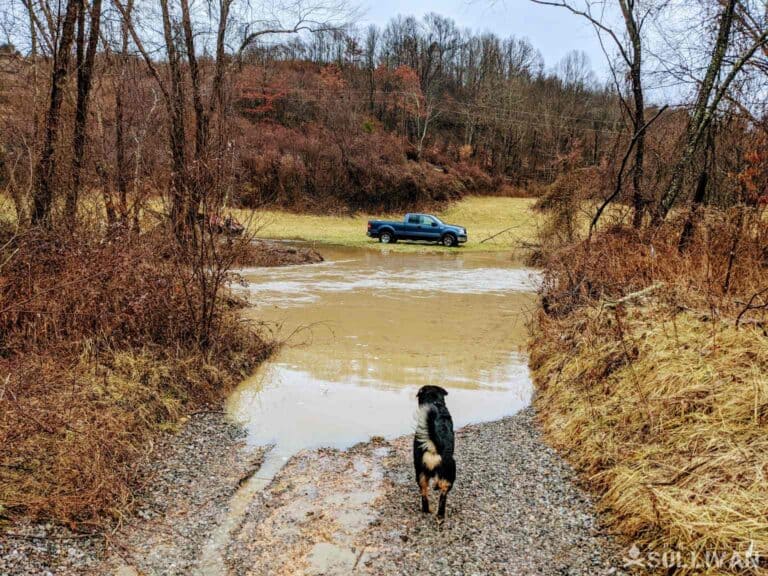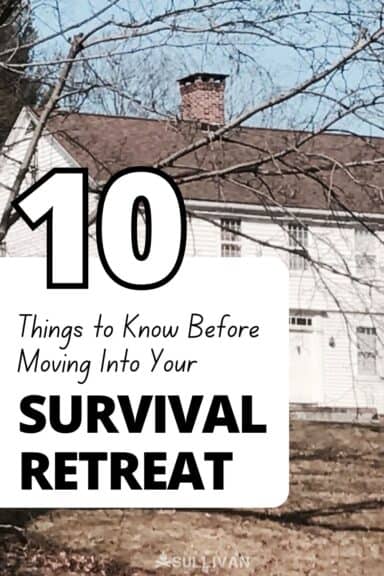For so many preppers, a survival retreat to call their own is both an aspirational goal and something they hope they never have to use. These properties are exactly what they sound like: a place to go when society is falling apart and all seems lost.

New England house next to two maple trees with sapping equipment installed
Properly chosen, prepared, and supplied, they will prove to be a valuable refuge indeed, but there are important factors that most folks don’t consider or simply forget about.
Understanding everything that’s at stake before moving into your survival retreat is paramount if you want a good outcome. Keep reading, and I’ll tell you about 10 such things you’ve got to know before you go.
Unattended Properties are Targets for Squatters and Theft
To some of us, this will be the most obvious thing in the world. To others, not so much, and it’s a painful lesson to learn. Most preppers don’t live in their chosen survival retreat full-time. Some of us do, and that’s great, and in that case, this advice won’t apply to you…
If you leave any property unattended, unsupervised, and unsecured, it’s only a matter of time until you attract squatters and thieves.
You might wind up with vagrants camping on your land or a family of people illegally living in your own home, and in these days, legal recourse is expensive and slow to come.
The point is you’ve got to do whatever is needed to keep tabs on your property in the interim to discourage this activity and prevent such outcomes.
You Won’t Have Much Contact With Your Neighbors
A proper survival retreat is typically located in a barely populated area. The fewer people, the better when it comes to surviving times of societal upheaval.
But this is a double-edged sword: your neighbors—defined here as people who own adjoining properties, however far away they are—likely won’t know you very well and might not even care to get to know you.
That means you’re going to be surviving next to people who are strangers for all intents and purposes. Even if you do have friendly relations with them, they’re likely to be so far away and dealing with their own issues that you aren’t going to see them regularly. You should plan accordingly.
Isolation Will Affect You Mentally and Emotionally
This is an issue I’m passionate about because I see it pop up over and over again. I know plenty of skilled, determined preppers who have it all together but suddenly come undone when faced with isolation—real isolation, that is.
It’s one thing to be by yourself when society and human contact are just outside your door. It’s another thing to be truly alone with nothing but four walls to keep you company for the foreseeable future.
The sheer remoteness of a survival retreat can affect you and members of your family in unexpected ways. The added stress can complicate your survival efforts, and so it is best to do an extended “test run” before you are forced to bunker down for real.
Without a Large Group, Maintaining Security is a Real Challenge
A big property with distant neighbors and plenty of land and natural resources is a dream for most of us, but more assets always mean more problems. Maintaining security—ongoing security—when at your survival retreat is going to be very difficult if you don’t have a big family or survival group with you.
You can only effectively surveil so many places at once, and even if you are dedicated to regular patrols and inspections, you’ve eventually got to sleep. One or two more people can certainly make this task easier, but there’s a whole, whole lot more to do than just stay on guard if you want to survive.
You’ll need to leverage knowledge of your property and surrounding areas along with every technological advantage you can to stay secure in this situation.
Your Property’s Resources May Become a Target
If your property has a spring or clean, flowing water, timber, farmable land, and other natural resources, you should expect it to become a target in times of trouble.
That’s just the way it is. It’s awful, but there are people out there who are like us but without any sense of morality: they may already have your property in mind as a raid target when the balloon goes up.

dog looking at pick-up truck across flooded road
Access May Change Seasonally
How often do you go out to your survival retreat? When do you usually do it? Do you go in the summer or fall for an annual inspection? If so, you need to rejigger your schedule so you can visit in the spring and winter.
That’s because the entryways to your property could be dramatically impaired or even completely blocked in different seasons and climatic conditions. This is important because you won’t get to choose the day—or rather the season—when you need to head there for real!
Knowing what access issues await you will help inform route plans A, B, and C for bugging out.
Restocking Supplies Will Be Difficult or Impossible
Ask anyone who’s lived way out in the country for any length of time: simple errands like going to the grocery store can be a minor adventure! It’s going to be even more difficult and time-consuming to restock supplies—assuming supplies are out there to be had—if you move into your survival retreat full time.
Add in the uncertainty of the situation at large and the access problems mentioned previously, and it’s likely that you’ll only be able to resupply sporadically if at all. If you can’t grow it, make it, or trade for it with people in your neck of the woods, you probably aren’t going to get it.
In Remote Regions, Bartering is the Standard
Speaking of trading, when times are really tough and faith in society is in the toilet, don’t count on your dollars being worth anything to people in your area. Hard goods and consumable resources will once again become the only currency that matters.
You should plan around this by stocking up on things that are universally valued by people, especially when the sky is falling: cigarettes and other tobacco products, alcohol, fuel, food, medicine, and so forth will generally let you get what you need from others.
Assuming you’ll just sell firewood harvested from your property isn’t going to cut it; chances are everyone else in the region has plenty of the same thing!
No One is Coming to Help in Time
Making the call to move yourself out to a survival retreat is often done to reduce existing risks, but you must keep in mind you’ll be taking on other, different risks, too.
The farther you are away from society and people, the farther you are away from folks who could help you. I mean folks outside of your immediate family or group. If you make it really hard for the cavalry to reach you, don’t be surprised when they don’t make it in time.
You’ll be truly on your own when it comes to pressing emergencies at your retreat; if you can’t get it done, you might be done for.
Your Retreat May Only Be Temporary
Lastly, never fall into the trap of thinking you’ll be safe for the duration at your survival retreat. As grim as it is to consider, it might only be temporary.
Whatever sent you running there in the first place might end up running you off of that property too, whether it’s some other new and emergent threat or something else entirely. Failing to plan a secondary bug-out from your primary bug-out location could prove to be a fatal mistake.

The post 10 Things to Know Before Moving Into Your Survival Retreat appeared first on Survival Sullivan.
By: Tom Marlowe
Title: 10 Things to Know Before Moving Into Your Survival Retreat
Sourced From: www.survivalsullivan.com/know-before-moving-to-survival-retreat/
Published Date: Sat, 08 Feb 2025 14:43:36 +0000
------------------------
Did you miss our previous article...
https://bushcrafttips.com/bushcraft-news/how-to-make-a-shepherds-sling-from-paracord
 What is BushcraftSurvival SkillsToolsVideosBushcraft CampsBushcraft KitsBushcraft ProjectsPrivacy PolicyTerms And Conditions
What is BushcraftSurvival SkillsToolsVideosBushcraft CampsBushcraft KitsBushcraft ProjectsPrivacy PolicyTerms And Conditions
